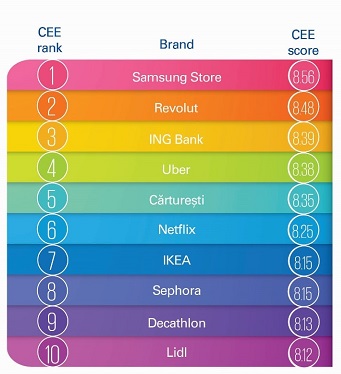KPMG in Romania launches The Romanian Market 2019 Customer Experience Analysis
After 10 years of global rollout, evaluating consumers’ appreciation of the experiences they have received from brands across a range of sectors in multiple countries, KPMG is pleased to announce the launch of the 2019 Customer Experience Excellence research in Romania.
The central theme of the report is customer excellence as a source of competitive advantage – a defining characteristic of all companies that manage to achieve leading positions in a time of unprecedented economic and business complexity. In Romania, the report analyzed the responses of 2,499 customers, evaluating 131 brands in 8 sectors and 15 sub-sectors. The report’s conclusions were based on the results for 103 brands that had a minimum of 100 responses.
In particular, we explore the means by which these companies create a customer focused culture and how that is realized across all aspects of their business, ultimately resulting in outstanding experiences for their customers. For these companies, “customer” continually pervades their thinking. Serving customers by solving their problems and meeting their changing needs is their raison d’etre, their motivation and their enduring quest.
Ramona Jurubiță, Country Managing Partner at KPMG in Romania, commented on the study results:
“Our Global 2019 Customer Excellence research has showed that in the context of a VUCA world, customer experience excellence is the result of intentional, well-assessed and planned interventions. It has also showed that there are three defining and competitively advantageous characteristics of customer focused companies: they are customer led, they are insight driven and they practice customer foresight to anticipate customer needs. Not surprisingly, we see these characteristics in the champions of the Romanian market. At the same time, our research shows the challenges and opportunities that many brands are facing today, most of which cluster around gaps to be filled within the 6 Pillars framework. We are happy to share these findings with you and contribute to improving the customer centric philosophy and management on the Romanian market.”
To identify the Customer Experience leaders, brands were ranked across the Six Pillars of Customer Experience Excellence (CEE): Personalization; Integrity; Expectations; Resolution; Time & Effort and Empathy.
- In Romania, Integrity matters most in Customer Experience, closely followed by Personalization
- On average, Advocacy and Loyalty in relation to a brand are mainly driven by the same Integrity and Personalization pillars
- Non-Grocery Retail is the best ranked economic sector
- Companies that concentrate on omnichannel presence appear to be better ranked in terms of Customer Experience excellence
- The top-ranked brands typically outperform the respective market average score for each pillar
- Companies that capitalize on client interaction through the gathering of insights and customer journey design, across the 6 Pillars, achieve better positioning
- Empathy appears to be the most challenging pillar
Victor Iancu, Customer Advisory Lead at KPMG in Romania, explains: “We see today a Romanian customer that is more connected than ever, more demanding and willing to switch providers with little or no effort. Digitalisation, and technology in general, have made this possible as competitive advantage is increasingly based on knowing your client and creating tailored experiences, as well as on building honest, transparent relationships. We see this by looking at the two main pillars, Personalization and Integrity, that dominate the results in terms of importance in the 2019 Romanian CX report. The relevant insights show that the Romanian market, albeit being reasonably polarized, has generally embarked on a serious journey to delivering customer excellence.”
Aura Giurcăneanu, Partner, Head of Consumer Markets & Retail: „Retail has generally scored well in this survey, with several leading names in the top 10. In Romania, we have seen strong growth in the sector in recent years, with a number of more specialist retailers entering the market and finding a niche. Naturally, this has led to greater competition, and also consumers are increasingly focused on quality and personalization of interaction. Digital transformation has been critical in terms of meeting customers’ expectations. Overall, customer excellence is essential for success in this sector and it is good to see that many Romanian retailers have understood this.”
Tudor Grecu, Partner, Head of Financial Services: „The financial sector has seen significant transformation in recent years, with the rapid development of technology and the emergence of some disruptors on to the market. New firms and a few established players are challenging traditional practices and this is making customer experience excellence a priority, both for the newcomers and for the established players which have to keep up. Financial services have done well in the survey, and two banks made it into the Top 30: ING (3rd) and Banca Transilvania (11th). Both have adopted an intensive customer-centric approach. However, many banks and insurers still need to tackle the legacy of complex organizational structures and cumbersome (sometimes obsolete) internal systems and processes.”
Adela Ciucioi, Partner, Head of Technology, Media & Telecom: „The Romanian telecoms sector has seen significant transformation in recent years, and we are now witnessing consolidation on the market. Overall, the sector scores lower than the market average for customer experience excellence, reflecting the demanding nature of today’s telecoms consumers, who look carefully at what is offered by each provider. Given the ease with which businesses and individuals can now move from one provider to another, the successful players in the future will be those which focus closely on their customers.”
Bogdan Văduva, Partner, Head of Energy & Natural Resources: „There is opportunity for improvement for the energy sector, as no companies in the sector made it into the top 50. One of the reasons is that clients tend to interact less with energy companies than with other providers, and so it can take a long time before positive changes make an impact at customer level. Historically, energy companies have often been in a monopoly position, with little incentive to improve their customer experience. But that has now changed – consumers have greater choice and there is much more competition in the sector. So energy companies will need to develop a closer relationship with their customers if they are to succeed in the future.”
Mădălina Racovițan, Partener, Head of People Services: “In order to attract and retain the top talent, employee experience must be at the top of the agenda for any leading organisation. The key to delivering a meaningful experience lies in understanding your employees’ needs and desires and responding in an authentic manner but delivering employee experience excellence requires high performance in each of the six Pillars previously described.”
The research for this report was conducted via an online survey methodology, completed between 14 May and 10 June 2019. A nationally representative consumer sample was targeted, to be representative in terms of age and gender, whilst also targeting regional representation. To participate in the research, and to be able to respond to questions on a specific company, respondents must have interacted with that company in the last 6 months. An interaction is defined as making a purchase, using the company’s products and services, contacting a company with a query, or even browsing its website or store – so not all respondents will have been existing customers of the brand they evaluated. In order to be included in the final rankings each brand must have achieved a minimum of 100 consumer responses.
The KPMG global research project was initiated as a think-tank more than a decade ago with the creation of a center for customer experience excellence. A decade of experience in optimizing standards at a global level for excellence in customer experience analysis has involved 275,000 customers being interviewed, 3 million individual reports, and the development of a KPMG philosophy for best practices to achieve quality customer experience, disseminated across 24 countries.







